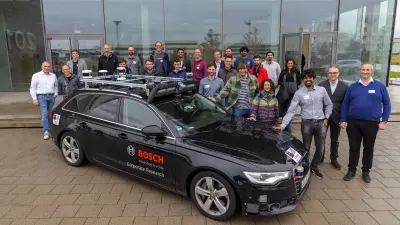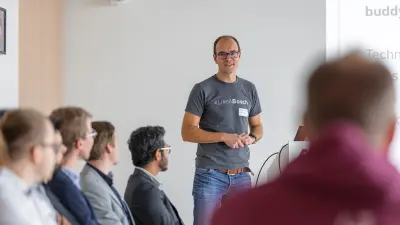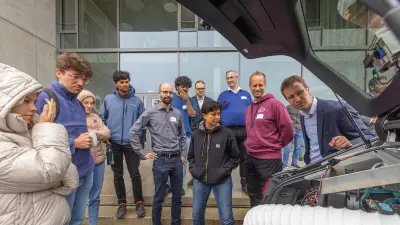University collaboration on AI-based driving
In a joint cooperation, Bosch Research is investing around 3.7 million euros over a period of three years to support ten doctoral students in three laboratories at the University of Freiburg. The mission: to revolutionize the development of intelligent and reliable autonomous vehicles in Germany.

Under the leadership of Prof. Abhinav Valada from the Faculty of Engineering at the University of Freiburg, Bosch Research is supporting the collaboration in the financing and implementation of research projects. Dr. Claudius Gläser is responsible for project management at Bosch Research.
Another focus of the initiative is the support of ten doctoral students, who are supervised by three project leaders from the University of Freiburg: Prof. Abhinav Valada (Robot Learning Lab), Prof. Frank Hutter (Machine Learning Lab) and Prof. Joschka Bödecker (Neurorobotics Lab).
The PhD students will work hand-in-hand with Bosch researchers and university project leaders. In addition, semi-annual conferences will facilitate knowledge exchange and enable evaluation of real Bosch autonomous vehicles. This real-world testing opportunity will provide students with a unique experience and insight into the complexities of developing autonomous driving systems in an industrial environment.

Unique goals
The central theme is the development of state-of-the-art AI algorithms for autonomous driving, with a focus on performance, scalability, and reliability. In contrast to conventional approaches to automated driving, the focus will be on a networked framework in which different modules are integrated and optimized together to improve the robustness of the system. An example is “environmental perception and planning”, where the two tasks are optimized together to avoid overly conservative or overly aggressive behavior depending on the situation, which should lead to more human-like driving behavior of the autonomous vehicle.
The focus shifts from the opaque nature of deep learning models to a “white box” approach. Subcomponents within the system provide intermediate results that can be interpreted by humans, thus promoting trust and simplifying certification processes. In addition, innovative neural architecture search methods will be developed to simplify the design and optimization of network architectures.
In addition to the software prototypes, the expected results include the publication of numerous research papers in prestigious conferences and journals, which should significantly advance the field.

The collaboration between Bosch Research and the University of Freiburg is not only beneficial for both institutions, but also has the potential to change the future of automated driving by highlighting the safety, reliability and innovative strength of the German automotive industry.
The AutoML Lab has been working closely with Bosch Research since 2018. Numerous projects have already been successfully completed. Together, we focus on the development of Bosch-relevant methods to support the application of AutoML-based solutions in Bosch production. The AutoML Lab, headed by Prof. Frank Hutter, is a joint research laboratory of the University of Freiburg and Bosch to strengthen joint research and information exchange in the field of machine learning.